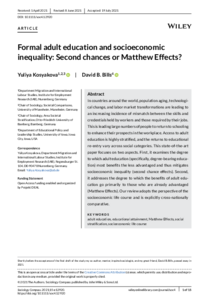Formal adult education and socioeconomic inequality: Second chances or Matthew Effects?

Kosyakova, Yuliya ; Bills, David B.
2021
15
e12920
1-15
adult education ; lifelong learning ; social inequality
Education and training
https://doi.org/10.1111/soc4.12920
English
Bibliogr.
"In countries around the world, population aging, technological change, and labor market transformations are leading to an increasing incidence of mismatch between the skills and credentials held by workers and those required by their jobs. This is leading large numbers of people to return to schooling to enhance their prospects in the workplace. Access to adult education is highly stratified, and the returns to educational re-entry vary across social categories. This state-of-the-art paper focuses on two aspects. First, it examines the degree to which adult education (specifically, degree-bearing education) most benefits the less advantaged and thus mitigates socioeconomic inequality (second chance effects). Second, it addresses the degree to which the benefits of adult education go primarily to those who are already advantaged (Matthew Effects). Our review adopts the perspective of the socioeconomic life course and is explicitly cross-nationally comparative."
Digital
The ETUI is co-funded by the European Union. Views and opinions expressed are however those of the author(s) only and do not necessarily reflect those of the European Union or the ETUI.